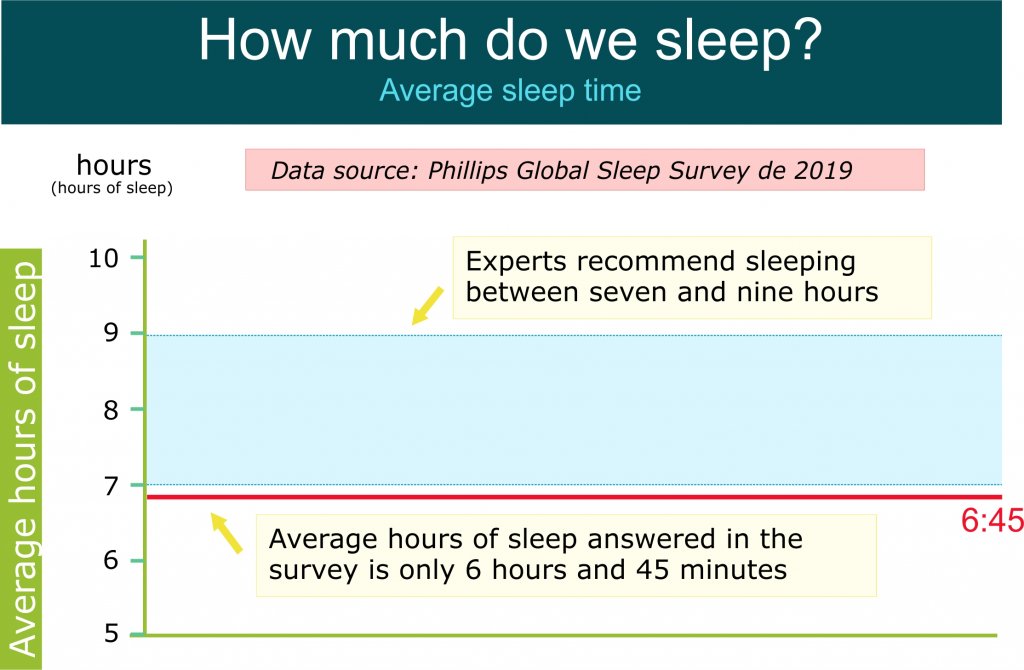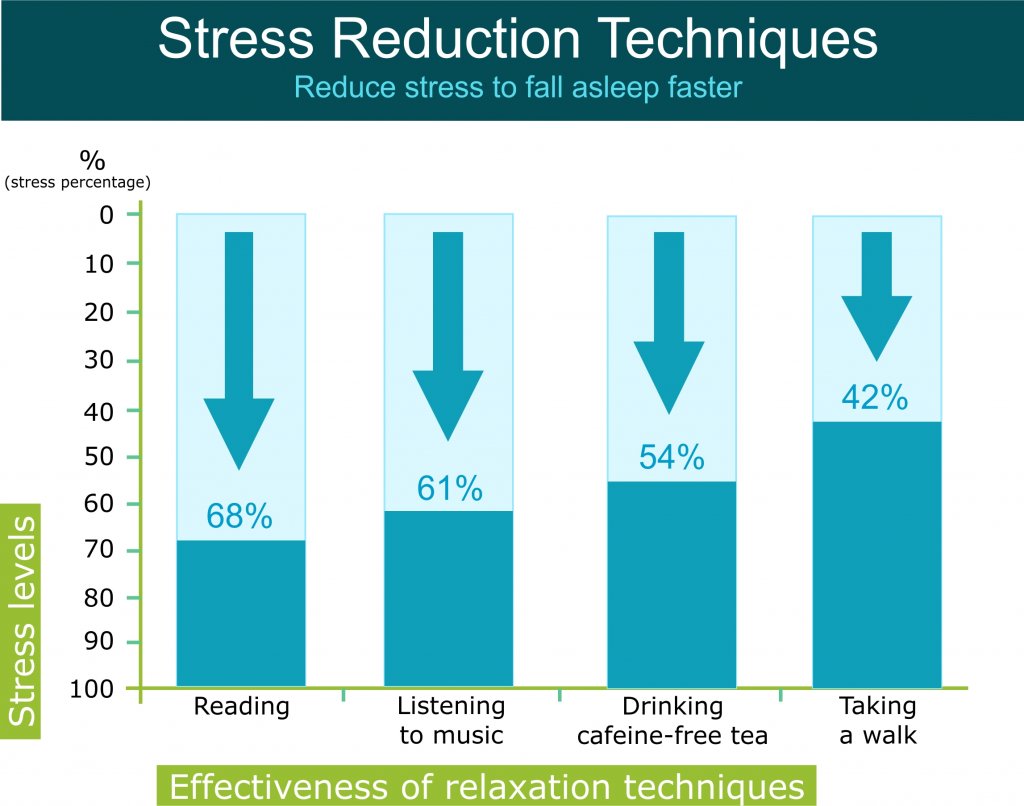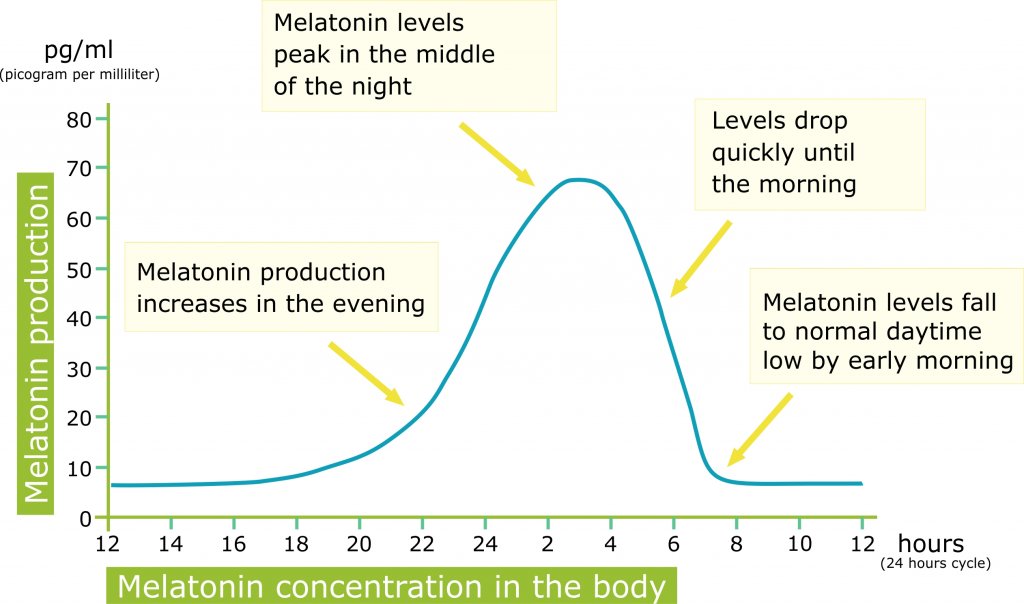More and more people want to know how to sleep well and how to fall asleep fast and with good reason. Consistently sleeping well has profound benefits for both the mind and body. Sleeping poorly, on the other hand, can have serious and even fatal consequences. Nowadays, scientists speculate that sleep may be even more important for our health than diet and exercise.
Sadly, despite the overwhelming evidence supporting the importance of sleep, a large percentage of the world’s population is sleep deprived and searching for solutions to their sleeping problems. In the 2019 Phillips Global Sleep Survey, answered by over 11,000 adults from 12 countries:
- Only 10% of adults reported sleeping extremely well
- The average sleep time reported during the week was only 6.8 hours per night. Experts recommend 7 to 9 hours.
- 80% of adults reported wanting to improve their sleep.
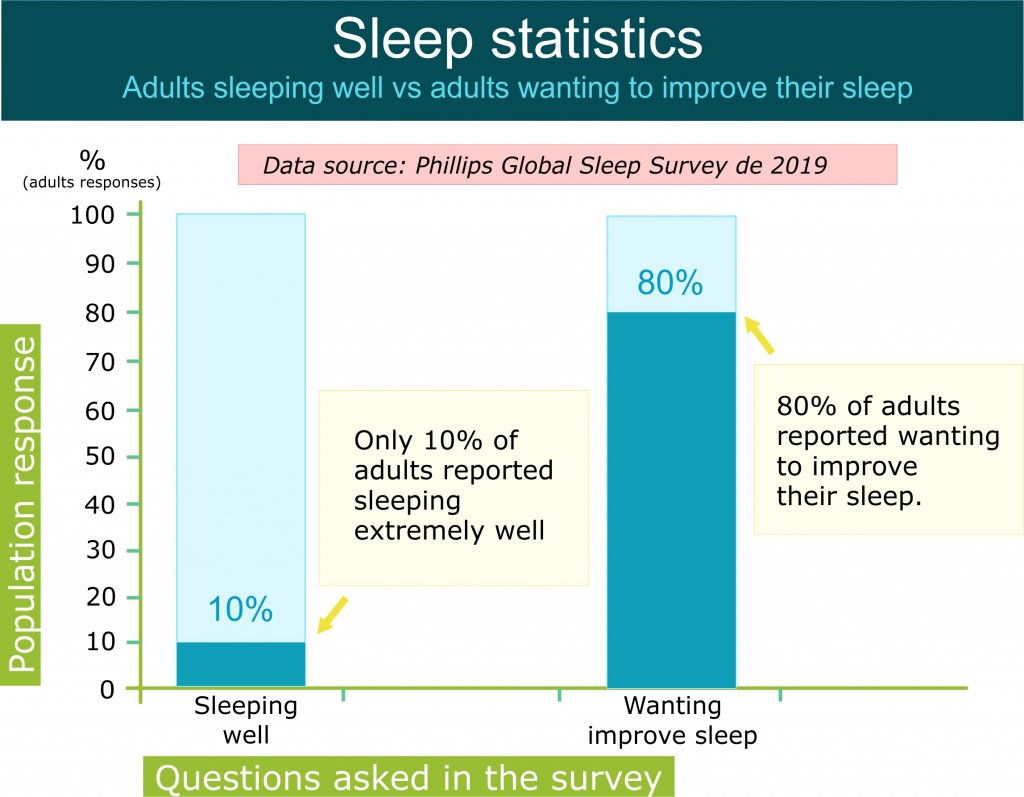
Would you like to learn how to fall asleep fast and stay asleep throughout the night? Here are 27 tips and strategies to improve your sleep. Try one, try more than one, or better yet, combine as many as you can. The results will be well worth it.
- 1 Habits, techniques, and other sleep solutions to fall asleep fast
- 1.1 1. Try some light reading.
- 1.2 2. Enjoy a hot shower/bath before bed
- 1.3 3. Expose yourself to abundant sunlight during the day (light therapy)
- 1.4 4. Enjoy some soothing music for sleeping
- 1.5 5. Take a melatonin sleeping supplement
- 1.6 6. Try some other sleeping supplements
- 1.7 7. Sip an infusion or tea
- 1.8 8. Try some essential oils (aromatherapy)
- 1.9 9. Sleep with a sleep mask
- 1.10 10. Try out some earplugs
- 1.11 11. Turn on a sound machine for sleeping
- 1.12 12. Upgrade your bedding
- 1.13 13. Practice meditation
- 1.14 14. Try the 4-7-8 breathing method
- 1.15 15. Visualize positive imagery
- 1.16 16. Use the progressive muscle relaxation technique
- 2 Habits and behaviors you should limit
- 2.1 17. Limit caffeine after 3:00 PM
- 2.2 18. Limit alcohol less than 3 hours before bed
- 2.3 19. Limit tobacco and nicotine before bed
- 2.4 20. Limit long naps
- 2.5 21. Limit intensive exercise in the late evening
- 2.6 22. Limit eating and/or drinking a lot before bedtime
- 2.7 23. Limit sugar in the late evening before bedtime
- 2.8 24. Limit stress or significant mental activity before sleep
- 2.9 25. Limit blue light in the evening
- 2.10 26. Don’t sleep in extreme temperatures
- 2.11 27. Medications that cause insomnia
- 3 The perfect bedtime routine to help you fall asleep fast
Habits, techniques, and other sleep solutions to fall asleep fast
1. Try some light reading.
Reading is one of the best ways to relax and reduce stress before bedtime. In one study by the University of Sussex, [1]https://www.telegraph.co.uk/news/health/news/5070874/Reading-can-help-reduce-stress.html researchers found that reading can reduce stress by up to 68%. To provide a sense of perspective, listening to music was found to reduce stress levels by 61%, drinking tea by 54%, and taking a walk by 42%.
2. Enjoy a hot shower/bath before bed
As part of our natural circadian rhythm, our body temperature naturally drops in the late evening hours (between 8:00 PM and 11:00 PM). This drop in temperature helps signal to our brain and body that it’s time to sleep. Taking a hot shower/bath is one of the best ways to lower our body temperature and initiate sleepiness. In one study by the University of Texas at Austin, [2]https://www.sciencedirect.com/science/article/abs/pii/S1087079218301552?via%3Dihub researchers found that bathing in water from 104 to 109°F (40 to 43°C) one to two hours before bedtime produced the best results. Participants who bathed at that time and temperature fell asleep about 10 minutes faster (on average) than usual.
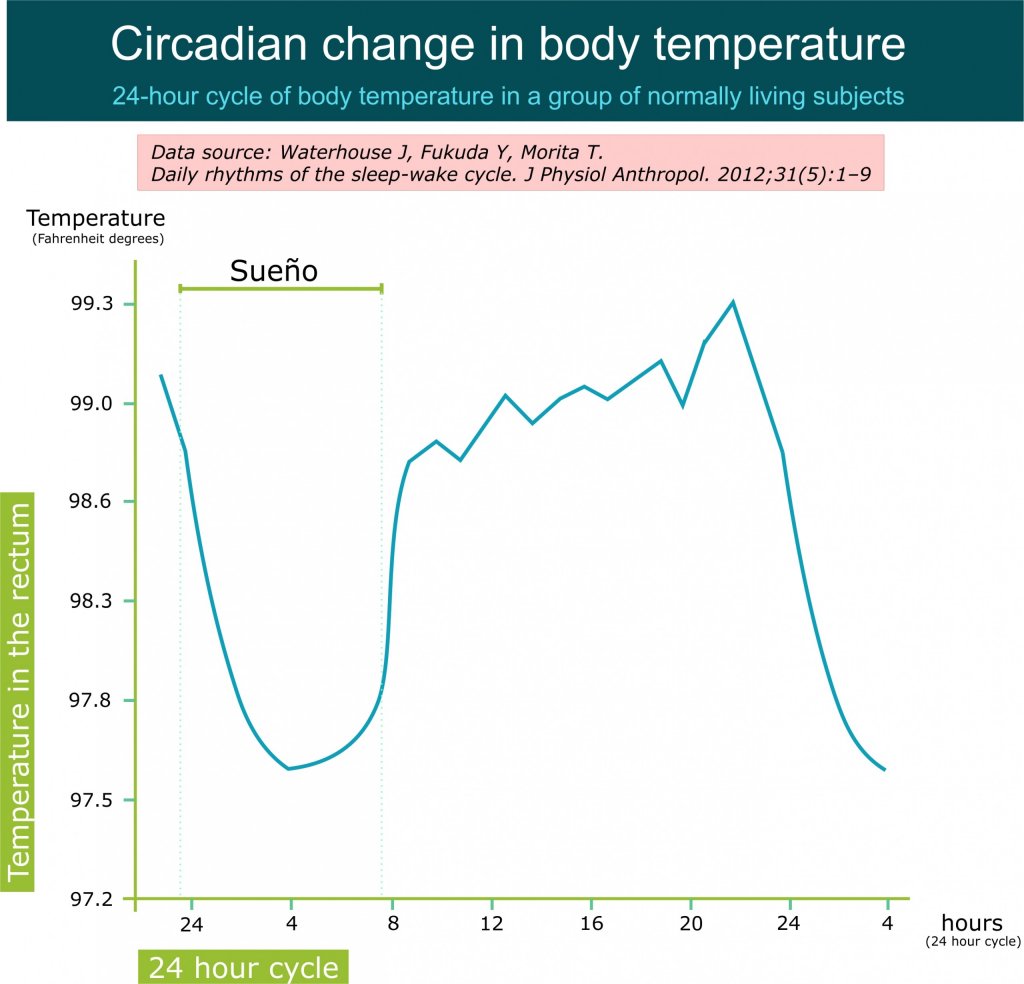
3. Expose yourself to abundant sunlight during the day (light therapy)
Light therapy for sleeping involves getting sufficient light exposure during the day, either naturally or artificial through a sun lamp, and reducing light exposure at night. The purpose of light therapy is to control the production and secretion of melatonin, the body’s natural sleep hormone. Light therapy is especially helpful for people who suffer from Delayed Sleep Phase Syndrome (DSPS), Advanced Sleep Phase Syndrome (ASPS), jet lag, problems associated with shift work, non-24-hour sleep-wake syndrome, dyschondrosis, and age-related sleep maintenance insomnia. [3]https://pubmed.ncbi.nlm.nih.gov/7632987/
4. Enjoy some soothing music for sleeping
Listening to music is another popular sleep aid. In the 2020 Philips Global Sleep Survey, 21% of adults reported listening to soothing music to help them fall asleep. Various studies report that slow, soothing music for sleeping can lower the heart rate and relax the body, [4]https://onlinelibrary.wiley.com/doi/abs/10.1111/j.1365-2648.2012.06130.x reduce anxiety and stress, or simply distract from stressful thoughts that prevent sleep. [5]https://academic.oup.com/jmt/article-abstract/42/2/140/937831?redirectedFrom=fulltext Experts recommend choosing songs with a slow rhythm of 60 to 80 beats per minute, but choosing the right music for sleeping really depends on personal preferences.
5. Take a melatonin sleeping supplement
Melatonin is a natural hormone produced in the pineal gland of our brain that helps us synchronize our 24-hour cycle of wakefulness and sleep known as our circadian rhythm. It is a key hormone for sleeping, which is why it is known as “the sleep hormone”. Many people take melatonin as a sleep supplement to initiate sleepiness so they can fall asleep faster and enjoy better quality sleep. Melatonin is especially helpful for circadian rhythm sleep-wake disorders like jet lag disorder and shift work disorder.
6. Try some other sleeping supplements
Melatonin isn’t the only natural sleep supplement that can help you fall asleep faster and improve your quality of sleep. Some other common sleep supplements include:
- Tryptophan – Tryptophan is an essential amino acid that’s crucial for the production of melatonin (the sleep hormone) and serotonin (the hormone that promotes happiness and well-being).
- Magnesium – Magnesium is an essential mineral that calms the central nervous system and, as a result, prepares the body for sleep.
- Valerian – Valerian is a root/herb that contains a number of compounds that promote sleep and reduce anxiety. Valerian root also contains the antioxidants hesperidin and linarin, which may have sedative and sleep-enhancing properties. [6]https://www.sciencedirect.com/science/article/pii/S009130570300368X
7. Sip an infusion or tea
Herbal teas (caffeine-free, of course) and infusions can also help you fall asleep faster and improve the quality of your sleep. People have been using teas and infusions made from the leaves, flowers, or roots of various sleep-inducing plants for hundreds of years. Here are some of the most common infusions and herbal teas for sleeping:
- Lavender – Lavender works as an anxiolytic and as a natural sedative.
- Valerian – Helps reduce anxiety and has sedative effects
- Chamomile – Reduces anxiety and induces sleepiness
- Lemon balm – Promotes relaxation
- Passionflower – Reduces anxiety and induces sleepiness
8. Try some essential oils (aromatherapy)
Essential oils are highly concentrated plant extracts that have been used for thousands of years for all kinds of therapeutic purposes, including improving sleep. Some oils and aromas have special properties that help to balance emotions and reduce anxiety or depression, which, consequently, helps people fall asleep faster and enjoy better sleep quality. Several scientific studies have concluded that certain oils and aromas do, in fact, improve sleep quality. [7]https://pubmed.ncbi.nlm.nih.gov/24720812/ Below are some of the most common essential oils to improve your sleep and help you fall asleep faster.
- Lavender – Combats insomnia and improves sleep quality
- Valerian – Helps you fall asleep faster
- Bergamot – Reduces blood pressure and anxiety
- Chamomile – Improves sleep quality, reduces anxiety and may even help reduce nightmares
- Salvia – Reduces cortisol (stress hormone) to help you sleep. Also has sedative effects.
9. Sleep with a sleep mask
If there’s any light in your bedroom at all, there’s probably too much light in your bedroom, and there’s a good chance a sleep mask will help you fall asleep faster. Even when the eyes are closed, our eyes are capable of picking up light from behind our eyelids. Any light the eyes can detect will reduce the body’s production and secretion of melatonin, which can prevent us from getting tired and make it difficult to fall asleep. Sleep masks are especially helpful if:
- If you work night shifts and have to sleep during the day
- To sleep on your trips (on the plane, train, etc.) and to relieve jet lag
- To take nap during the day
- If it’s impossible for you to create a pitch black sleeping environment
10. Try out some earplugs
Although some noises can be pleasant to fall asleep to like the sound of the ocean or the wind in the trees, many noises like snoring, barking dogs, and construction work (just to name a few) are unbearable and make it very difficult to fall asleep at night. Not to mention, our brain is capable of picking up the noise while we are sleeping, which means the noise can wake us up at night and worsen the quality of our sleep. The idea of sleeping with earplugs may sound uncomfortable to you, but, these days, there are enough designs and materials that you should be able to find a comfortable pair.
11. Turn on a sound machine for sleeping
Speaking of noise, some people actually fall asleep faster and enjoy better quality sleep when they listen to soft and pleasant sounds. Some common sounds and sound machines for sleeping include:
- White noise – White noise sounds a bit like light, steady radio static.
- Pink noise – Pink noise is white noise, but with lower frequencies. It resembles the sounds of steady rainfall or wind and is often considered to be more soothing than white noise.
- Brown noise – Brown noise lowers the frequency even more. It’s a bit rougher than pink noise and resembles the roar of a river current or strong wind.
Many sound machines for sleeping also offer other kinds of light background noise to help you fall asleep including light rain, city streets, fan sounds, and more.
12. Upgrade your bedding
Did you know that based on your unique sleeping style and biology, there is a perfect bed out there for you? If you’re a hot sleeper, for example, and you constantly feel like you’re burning up at night, you might want to consider cotton or linen sheets. If you’re a cold sleeper, on the other hand, you could try some flannel sheets. Your weight and sleeping position can also help you determine which type of mattress you should consider. Lightweight side-sleepers do best on soft mattresses, while heavier sleepers as well as stomach- and back-sleepers do best on firm mattresses.
13. Practice meditation
In a 2015 study published in JAMA Internal Medicine, [8]https://jamanetwork.com/journals/jamainternalmedicine/fullarticle/2110998 researchers analyzed the effect of meditation on adults with insomnia symptoms and found that meditation did lead to fewer insomnia symptoms and less daytime fatigue. According to the researchers, meditation helps improve sleep because:
- Meditation decreases anxiety and stress and promotes relaxation.
- Meditation improves control of the autonomic nervous system, which reduces how easily you’re awakened.
Researchers also think that meditation may:
- Increase melatonin (the sleep hormone)
- Increase serotonin (precursor of melatonin)
- Reduce heart rate
- Decrease blood pressure
- Activate parts of the brain that control sleep
14. Try the 4-7-8 breathing method
Have you heard of the 4-7-8 breathing method? The method consists of repeatedly inhaling for a count of four seconds, holding the breath for a count of seven seconds, and exhaling for a count of eight seconds until you fall asleep. By deliberately slowing down your breathing, you’re also forcing the rhythm of your heart to slow down. A slow heart rate relaxes the body and helps reduce anxiety, ultimately improving your sleep and helping you fall asleep faster.
15. Visualize positive imagery
Visualization is another great technique to reduce anxiety and fall asleep faster. The idea is that by focusing on pleasant and peaceful imagery, we can distract our mind from other racing and sometimes stressful thoughts that keep us awake at night. Here’s how you can use visualization to improve your sleep:
- Lie in bed in a comfortable position.
- Close your eyes.
- Imagine and visualize places that you have experienced where you felt deeply relaxed and at peace.
- Notice as many sensory details as you can like the time of day, the colors, warmth or coldness, textures, sounds, any people or animals that were with you, etc.
- Visualize this peaceful scenario for a few minutes.
- Drift off into sleep.
16. Use the progressive muscle relaxation technique
The progressive muscle relaxation technique is another technique that can help you fall asleep within minutes. The idea is to systematically tense and then relax all the muscle groups in your body. Progressive muscle relaxation can help relieve insomnia in two ways:
- Promotes physical relaxation – Many people who have trouble falling asleep get physically tense and restless. Progressive muscle relaxation can help to physically relax the body so we can fall asleep faster.
- Promotes mental relaxation – If we focus all of our attention on our body and the tensing and relaxing of muscles, then we’re not focusing our attention on other racing thoughts that can keep us awake at night.
Habits and behaviors you should limit
17. Limit caffeine after 3:00 PM
Did you know that caffeine can stay in your system for 10 to 14 hours? Caffeine not only makes it more difficult to fall asleep, but also worsens the quality of your sleep and shortens the duration. Not to mention, caffeine can disrupt your sleep cycle and limit your deep sleep, [9]https://ascpt.onlinelibrary.wiley.com/doi/abs/10.1002/cpt1976206682 which is the most physically restorative kind of sleep we experience. While one or two cups of coffee in the morning certainly has its benefits, consuming too much coffee or consuming coffee in the afternoon does more harm than good.
18. Limit alcohol less than 3 hours before bed
In the 2020 Philips Global Sleep Survey, which surveyed about 13,000 adults from 13 different countries, 11% of adults reported consuming alcohol as a strategy to fall asleep faster. Alcohol is a sedative, which means having a glass or two can help you fall asleep faster. But, as your body metabolizes the alcohol, and the sedative effects wear off, you experience what scientists call a “rebound effect.” The rebound effect causes frequent awakenings during the second half of the night and, ultimately, shorter sleep duration. [10]https://pubs.niaaa.nih.gov/publications/aa41.htm Long story short, alcohol can help you fall asleep faster but, at the same time, worsens the quality of your sleep.
19. Limit tobacco and nicotine before bed
Cigarette smokers are four times as likely as nonsmokers to report feeling unrested after a night’s sleep, and there are a couple reasons why. [11]https://www.sciencedaily.com/releases/2008/02/080204172250.htm First of all, nicotine is a stimulant which makes it more difficult for smokers to fall asleep. Secondly, nicotine can greatly disrupt your sleep cycle, suppressing both deep sleep and REM sleep. This means, cigarette smokers basically spend the entire night in light sleep and miss out on the benefits of deep sleep and REM sleep.
If you’re a smoker, and you want to improve the quality of your sleep, try skipping your last cigarette and sipping a cup of green tea instead. Green tea contains L-Theanine, a relaxing agent that produces similar anti-stress effects to the effects of smoking a cigarette. [12]https://food.ndtv.com/health/drink-green-tea-to-get-rid-of-smoking-addiction-693519
20. Limit long naps
If you’re feeling sleepy during the day, a nap can certainly help. Naps can restore alertness, enhance performance, improve your mood, and reduce your risk of making mistakes. In fact, research at NASA showed that naps really can fully restore cognitive function at the same rate as a full night’s sleep. They found that pilots who slept in the cockpit for just 26 minutes showed alertness improvements of up to 54% and job-performance improvements by 34%, compared to pilots who didn’t nap. [13]https://www.businessinsider.com/nasa-research-found-the-perfect-length-for-a-power-nap-2019-3
That being said, napping for too long (anything over 30 minutes) can disrupt your sleep cycle and make it more difficult to fall asleep later at night. If you struggle to fall asleep at night or suffer from insomnia, it might be best to limit long naps or avoid napping altogether.
21. Limit intensive exercise in the late evening
Do you like to exercise at night? Here’s some good news! According to a new study, exercising at night might actually improve the quality of your sleep, as long as your exercise routine of choice isn’t too rigorous. The researchers found that most types of exercise actually seemed to help people fall asleep faster and spend more time in deep sleep. Participants who took part in high-intensity exercises less than one hour before bed, however, took longer to fall asleep and had poorer sleep quality.
If you tend to exercise in the evening and have trouble falling asleep, you might want to try exercising a bit earlier in the evening or try a less intensive exercise routine. You could also try a natural sleep supplement or herbal tea to relax your body and mind before climbing into bed.
22. Limit eating and/or drinking a lot before bedtime
There is one problem with eating or drinking a lot before bedtime: There’s a good chance you’ll wake up in the middle of the night to use the bathroom. Waking up at night can disrupt your sleep cycle and worsen the quality of your sleep.
23. Limit sugar in the late evening before bedtime
Many of us have a sweet tooth at night and enjoy a bowl of ice cream or a piece of chocolate in the late evening. Unfortunately, research demonstrates that consuming sugar at night can pull you out of the deep slow-wave sleep [14]https://jcsm.aasm.org/doi/10.5664/jcsm.5384 that’s essential for physical restoration and healing, maintaining healthy metabolism, and healthy immune function. [15]https://www.yourhormones.info/hormones/growth-hormone/ Not to mention, sugar gives you a rush of energy (a “sugar rush”) that can make it difficult to fall asleep. If you simply can’t skip your sweet midnight snack, you might want to try a low sugar alternative.
24. Limit stress or significant mental activity before sleep
Do racing thoughts keep you awake at night? Many people struggle to calm their minds when they’re ready to fall asleep. In the 2019 Phillips Globals Sleep Survey, answered by over 11,000 adults from 12 countries, [16]https://www.philips.com/a-w/about/news/archive/standard/news/press/2019/20190307-philips-global-sleep-survey-shows-we-want-better-sleep-but-only-if-it-comes-easily.html 54% of adults said anxiety and stress keep them up at night. More than half of adults world-wide experience stress-induced insomnia. One of the best ways to prevent or treat racing thoughts at night or stress-induced insomnia is to limit significant mental activity before bed. If you suffer from racing thoughts or stress-induced insomnia at night, try reading, listening to a storytelling podcast, or listening to some soothing music before hitting the sheets.
25. Limit blue light in the evening
Your body’s production of melatonin (the sleep hormone) is dependent on light, or more accurately, lack of light. Of all visible light, blue light has the most energy and is, therefore, the most disruptive to your body’s production of melatonin. [17]https://www.livescience.com/53874-blue-light-sleep.html Unfortunately, blue light is everywhere nowadays. Most notably, the display screens of computers, electronic notebooks, smartphones, and other digital devices emit significant amounts of blue light. Using any of these kinds of devices in the late evening after the sun goes down can greatly disrupt your body’s production of melatonin and make it difficult to fall asleep at night. [18]https://www.livescience.com/53874-blue-light-sleep.html On the brightside, there are many solutions to this problem:
- Limit blue light in the evening.
- Wear blue light glasses to protect your body and eyes and ensure natural melatonin production.
- Take a natural melatonin supplement in the evening.
26. Don’t sleep in extreme temperatures
Temperature can have a big impact on the quality of your sleep. Heat, in particular, can cause substantial sleep disturbance during your deep sleep, resulting in significantly less deep sleep during the course of the night. [19]https://pubmed.ncbi.nlm.nih.gov/22738673/ Research suggests that ideal bedroom temperature varies from person to person but is usually somewhere between 15.5 and 19.5 degrees C or between 60 and 67 degrees F. In addition, as part of the body’s natural circadian rhythm, body temperature decreases at night, which helps initiate the production of melatonin and the onset of sleepiness. Turning the temperature down in the evening hours or even taking a hot bath or shower to lower your body temperature can be a great way to fall asleep faster and improve the quality of your sleep.
27. Medications that cause insomnia
Do you take any medications? There are many ways medicine can affect your sleep. Some medications, like medications for high blood pressure and asthma, can cause insomnia, making it difficult to fall asleep or stay asleep all night long. Other common medicines, like cough, cold, and flu medicines, can disrupt your sleep cycle, preventing your deep sleep, REM sleep, or both. And certain medications, such as antihistamines to treat allergies, can cause daytime drowsiness. Sleepiness and insomnia are some of the most common side effects of medications. If you’re currently taking medication and suspect that your medication might be the cause of your insomnia, talk to your doctor about switching. The benefits of your medication may not be worth the harmful side effects of sleep deprivation.
The perfect bedtime routine to help you fall asleep fast
Based on the 27 tips and strategies mentioned above, we created a perfect bedtime routine to help you fall asleep fast and improve your sleep.
2 to 3 hours before bedtime
- Eat dinner and hydrate
- Start avoiding bright screens and blue light (put on your blue light glasses)
1 to 2 hours before bedtime
- Take a warm shower/bath
- Get comfortable
30 minutes to 1 hour before bedtime
- Lower the temperature in the bedroom
- Take a natural sleep supplement like melatonin
- Enjoy a small cup of caffeine-free herbal tea
30 minutes before bedtime
- Create a relaxing atmosphere (music + aromatherapy)
- Enjoy a relaxing activity like reading or listen to a podcast
When you’re ready to fall asleep
- Turn on your white, pink, or brown sound machine (if you prefer to sleep with a little bit of sound)
- Put on your sleep mask
- Practice meditation
- Practice visualization
- Practice progressive muscle relaxation
- Practice the 4-7-8 breathing method
If you can’t fall asleep within 30 minutes
- Get out of bed
- Try to stay calm
- Enjoy a relaxing activity until you’re ready to try again
A good night’s sleep is the foundation to a happy and healthy life!
Referencias

